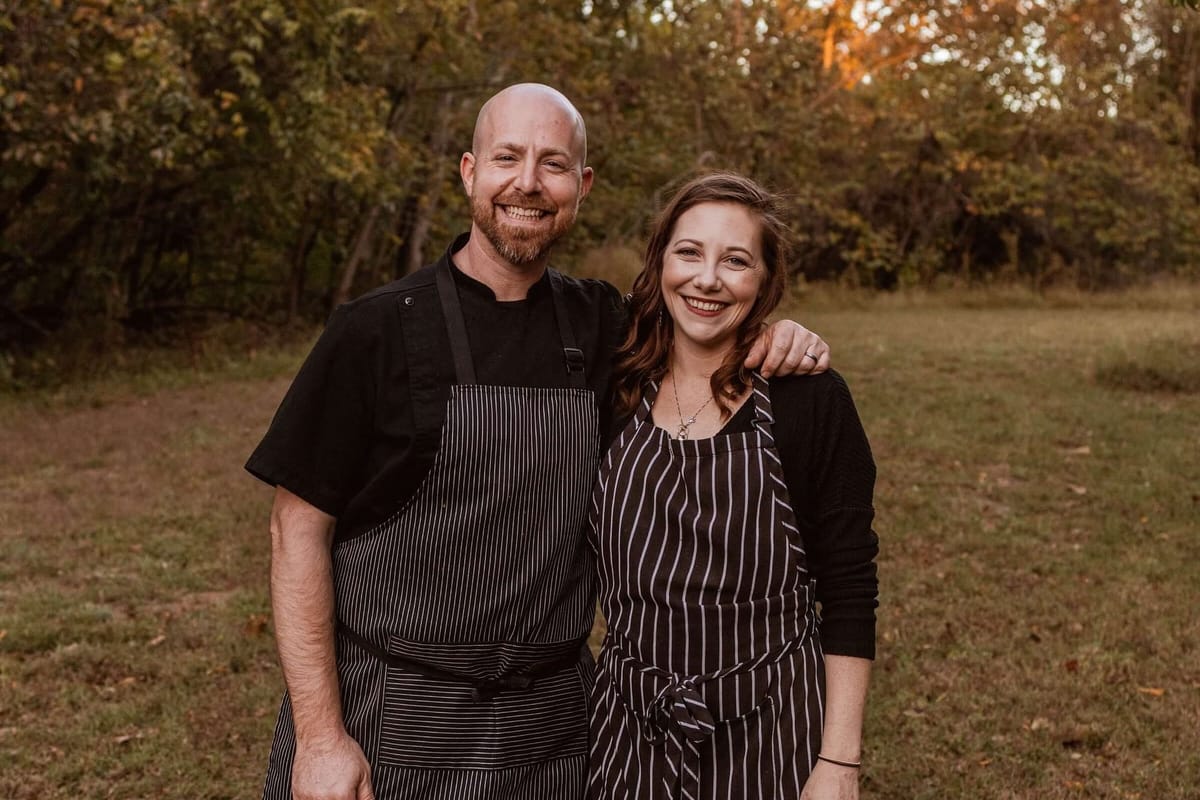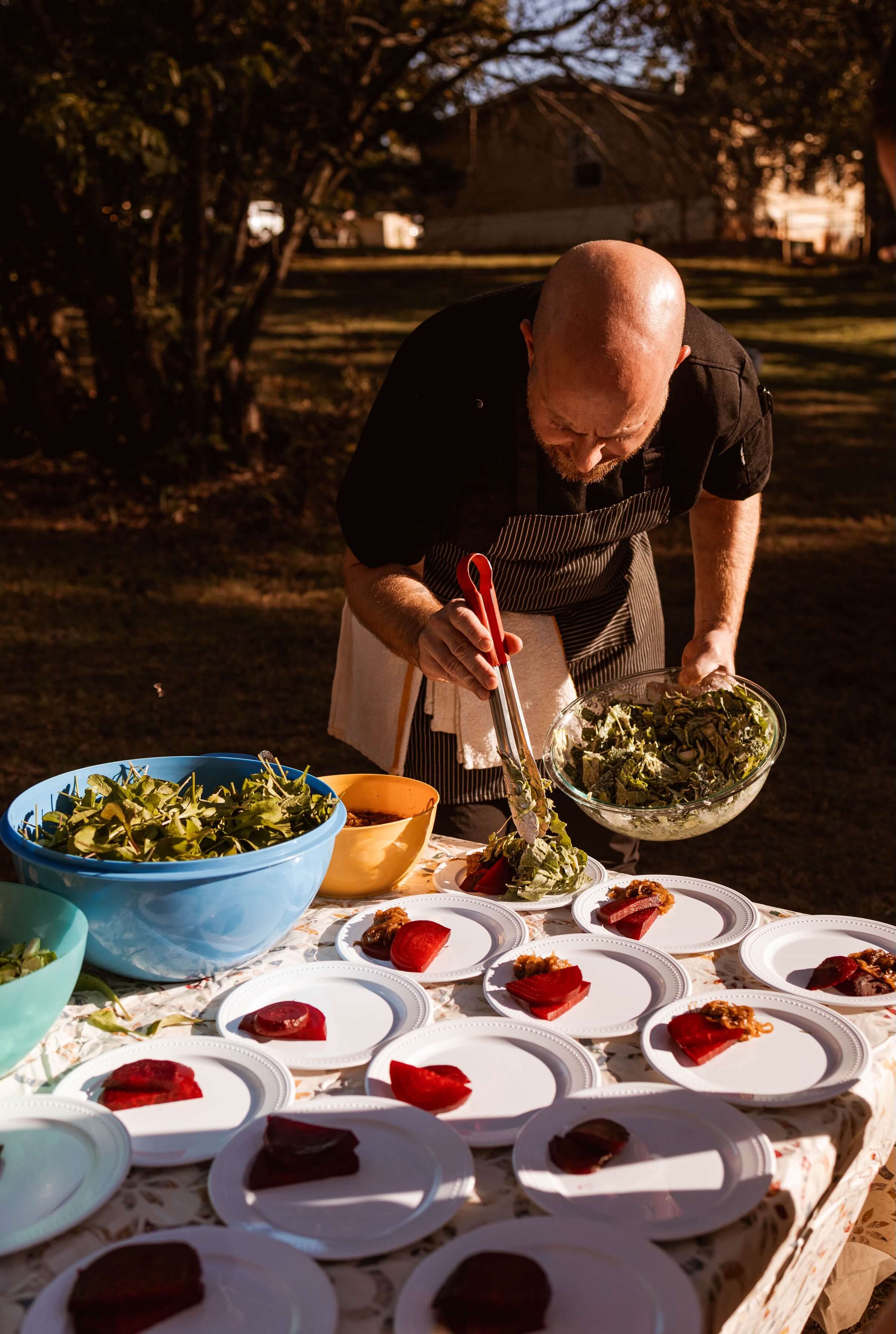
Chef Luke and Tylyn Fry decided that the best way to do a farm-to-table dinner is to go to the actual farm. The idea isn’t unique in the sense of serving a meal at its source; chefs have a long history of pop-ups on area farms and ranches, but the Frys have a multifaceted approach that is farmer-centric, not restaurant forward, as is typical.
Under the banner of Fryed House, the Norman-based couple hosts events at area farmers markets, sponsors classes and takes the show on the road, so to speak — to serve food produced locally on the farm where it was produced.
“With the dinners, we’re basically doing what I’ve been doing with banquets for years,” Luke says. “It just adds the two components of being in the place where the food was grown and the educational aspect. Our goal is to support local farmers by using their products at their place and at our other events.”
The tagline of Fryed House tells the goal succinctly: “Where every bite is a story.” The couple’s vision includes an intentional antagonism to commodification — the tendency to strip all products of their story, package them thoroughly and sell them to eager consumers. Where do oranges come from? Bananas? Beef? Who grew them, took them to slaughter, killed the cow, plowed the fields? What are their lives like, their bills, obligations, family structures? At each of their events, the Frys tell these stories as a way of honoring the work and reconnecting the food to the land, and us to the process.
Luke is from Norman; Tylyn grew up in Crescent, Oklahoma, and Panama City, Florida. At 21, she moved back to Oklahoma. They met when she worked at Coffee Slingers.
“I was at Red (PrimeSteak) at the time,” Luke says. “I rode my bike to the restaurant, and if I saw her through the window, I’d stop and get coffee; if not, I just went on to Red.”
He had landed the gig at Red after a culinary journey that began at Le Cordon Bleu in Chicago, progressed through a role at a Wolfgang Puck concept, an externship at Legends in Norman and Nonna’s in OKC, where he’d been promoted from grill cook to executive chef in two years. There were other stops along the way, including hotels, CBD sales and even luxury automobile sales, but food was always home base, as is Norman now.

Luke Fry plating a dish on location in true farm-to-table fashion.
They married in 2014, and now with their three boys (ages 5, 7 and 9), they call Norman home. They live close to the boys’ maternal grandmother, and are focused on building a mobile chef service that is firmly grounded in a specific place with its own stories.
“I walk my kids to the same school using the same route I took when I was their age,” Luke says. “Being a chef is about a connection to food and place, and we give back so we can help farmers, the people who produce the food we make our living with.”
Luke spent some time at a well-known farm-to-table concept in Oklahoma City, but that only point-ed out one of the realities of modern restaurants: “No matter how badly a restaurant or chef wants to be farm-to-fork, there are investors who are trying to maximize profits, and that comes at the expense of doing things the right way — supporting local farmers and supporting the community,” he says.
With Fryed House, they have a chance to do things differently. For the farm-based events, dishes are presented along with the story of the farm and farmer, as well as encouragement to support sustainable, local agriculture and the benefits associated. It’s a comprehensive bottom-to-top or origin-to-end process that decommodifies the process of preparing and serving food.
At their cooking classes, private dinners and farmers market events, they feature food from local farms and talk about sourcing, food preparation and the ways in which words like “organic” aren’t at all helpful to local agriculture.
“Most farmers are trying to farm properly already,” Luke explains. “The ‘organic’ designation just gives the USDA the ability to charge farmers for things they’re already doing. Building an event around that reality enables us to explain the process of producing high-quality, nutritious, flavorful food. Everything we do is centered on education.”
The Frys have two “long-term” plans, a three-year and five-year version. The three-year includes a mobile transit van stocked with the proper equipment to pull up to a farm and do a 50-person dinner. The five-year plan involves the family land where Luke’s mother now lives, and he sees a homestead with a farm, educational resources and, yes, a culinary establishment — but one that fosters community building not solo dining. They are, after all, proponents of connection.
Information about Fryed House, tickets for events, a schedule of offerings and Tylyn’s writing about food and agriculture can be found at FryedHouse.com.

